
Unicorn Overlord Review
I think expectations going into Unicorn Overlord are going to vary dramatically from person to person. That just makes sense though, as there hasn’t been a game quite like this in a long time, and this game is unlike most other titles made by Vanillaware, so there’s not a convenient point of comparison to make for most players. In terms of grid-based Japanese Strategy RPGs in recent years, there’s a more obvious comparison to make to Fire Emblem, as well as more traditional SRPG-formatted games like Triangle Strategy. Japanese RTS games have become more niche, with the only one I can recall in recent years being the underrated The Diofield Chronicle. This genre clings to popular concepts that typically work for the handful of games that make it big. That, or the echoes of games popular in the genre’s heyday decades before.
When the marketing proclaimed this was the “Rebirth of tactical fantasy RPGs” I’ll admit, it set pretty high expectations. I wouldn’t consider myself a Vanillaware super fan, but they’re a developer I’ve respected about as long as I’ve been playing games. Muramasa, 13 Sentinels, and Odin Sphere are all well-made games, so I was excited to see how they’d take on one of my favorite genres.
Unicorn Overlord is very much its own beast, but it feels stuck heavily between its inspirations of Quest’s Ogre Battle series and Fire Emblem. The gameplay is undeniably in the vein of Ogre Battle, specifically the Nintendo 64 classic Person of Lordly Caliber. To prepare for writing this review, I had hoped to give this game a full shot, but Nintendo 64 is about the last retro system I wish to own, so I settled for watching some gameplay online and put this neat-looking game snuggly in my backlog. Right next to Tactics Ogre Reborn and the original Ogre Battle’s Sega Saturn port. The storytelling feels far more Fire Emblem, up to the quality of antagonists and the formula and rhythm of how the plot plays out. Between these two points of inspiration is the occasional original idea that has potential but is ultimately drowned out by a game that cannot help but suffocate in its attempt to be a nostalgic callback.
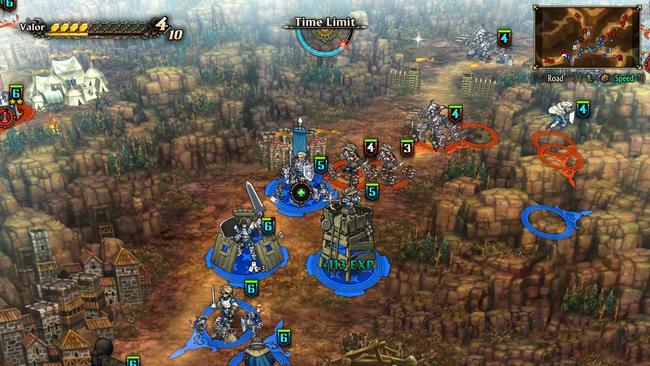
I don’t think I’ve ever been more conflicted in reviewing a game in all my years as a media critic. Unicorn Overlord is undoubtedly a well-made game as well as a visual marvel that will be discussed as one of the best-looking SRPGs ever made. This is a game only Vanillaware could have made, and one filled with many brilliant ideas. By the time I had seen and done everything it had to offer though, I felt those ideas were never fleshed out to make a brilliant game. So, for as much fun as I had, I feel Unicorn Overlord misses the mark of greatness by the overwhelming amount of small blemishes in the package.
The gameplay of Unicorn Overlord is that of a globe-spanning RTS where units are directed to specific points or enemies on the map, which exist as sectioned-off areas from the fully explorable world. Every map has goals and objectives, with a time limit to slightly push you to not wait around or play too defensively. I always found the time limits to be generous, and there’s a pause available at any moment if you get overwhelmed. Every unit has a set of Action Points, and when that number hits 0 they cannot move until they rest and restore those points. Progress doesn’t follow exact turns, but formation speed is tied to what unit you set to lead them. Mounted units can travel fast, but will have issues getting through terrain that infantry units might not. Flying units are slow but can go over any terrain, and are especially great at pointing at bosses and eliminating the problem immediately if decked out with a strong team. Every single class has a unique Leader Skill, so it’s a good idea to wield a variety of classes, not have purely mounted or flying units.
Ranged characters like mages or archers can provide assists in battle, with the enemy being able to utilize the same strategies. This also leads to needing to weigh your options on which threats are more imperative than others. Do you go for the garrisoned enemy fast to prevent others from spawning from their base, or do you take your time and pick off the support around it to weaken it? Unicorn Overlord is best in these little moments, since its game flow is well-designed.
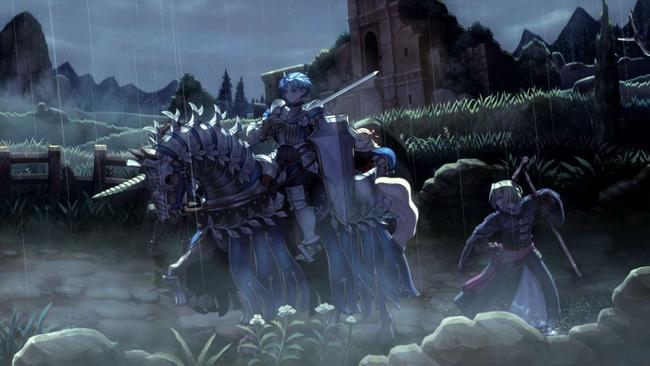
It’s thrilling to rush ahead and be surprised by a little ambush, or notice you left your home base unattended and need to decide quickly what the best method to retreat a unit before you lose the mission. I’d say Vanillaware is at their best when they’re subverting expectations, and you’ll definitely see that a lot in small ways here. Unfortunately on a larger scale, Unicorn Overlord does very little to break new ground.
I typically am not the type of guy to harp on difficulty. I’ve said it before in reviews of SRPGs, but I’m not nearly skilled enough to call myself a true enthusiast. Hell, I’m not even an RTS fan. I love these games, I’ll always excitedly buy new entries even if they don’t all click with me. There are a handful of titles in this genre I’m pretty alright at, but it is worth mentioning that I’m never the type of person to play a SRPG on a harder difficulty level. I play every single Fire Emblem game on Normal/Casual, and sometimes tend to struggle with the ones people consider fairly easy. So when I say this, I want you to understand I don’t do so in an attempt to gatekeep or shame people for being more casual than me. For all intents and purposes here, I’m a casual.
Unicorn Overlord is the easiest SRPG I’ve ever played. I don’t think that easy games are inherently bad, of course, but the ways in which this game is frictionless lead to a gameplay loop that ends up being more boring the longer you play the game.
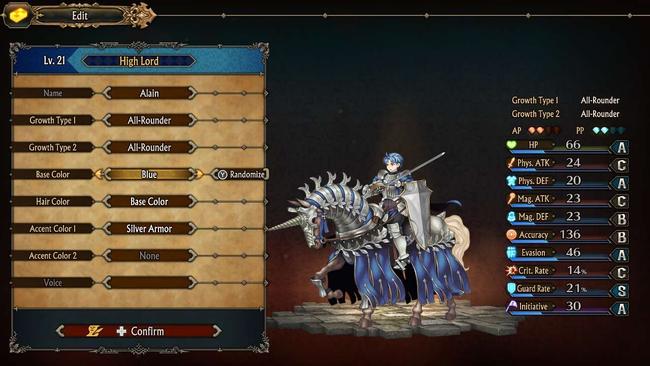
I played my entire playthrough on the Tactical difficulty, the second highest available from the get-go on launch. I was initially intending to just play the game on Normal, which is what I had picked when the demo released close to launch. In this demo there were only three difficulties, but the “Day 1” patch that was applied when we got our copy in changed these up. Normal became Tactical, Easy became Normal, a new Story difficulty became available, and all difficulties were tuned down according to the official patch notes.
Tactical difficulty delivers a healthy amount of stressful gameplay early on, and my initial impressions were absolutely glowing. The gameplay loop is strong, with exploration and helping those in need building off one another. Assembling your formations offers a lot of strategy, and keeping those formations stocked up and evenly stocked with the right allies will be life or death as you liberate the first continent. I’d argue that after this opening continent, the difficulty just completely falls off right until the very end of the game. Around the third continent (Elheim for me) I felt I had seen everything that Unicorn Overlord had to offer, and by the time I liberated the world, this had been confirmed to me.
The depth put into formation building allows for some of the most customizable SRPG gameplay I’ve ever seen, and I had a great time discussing class strengths and weaknesses with other players as I made my way through. You can program in skills for every single character based on a variety of situations, seemingly directly inspired by Final Fantasy XII’s amazing gambit system. Discovering optimal synergies between them is fun, but I feel like it created balancing issues for the developers.
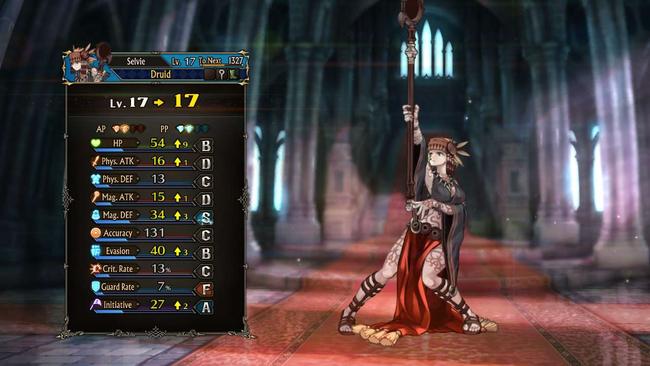
On any difficulty easier than Expert, team synergy feels like it doesn’t really matter. I experimented with this review to try to play the game as the average person/newcomer would. I used auto-optimization often for character equipment and skill programs, and built formations based on vibes and established character dynamics, rather than ironclad battle synergy. I made an effort to keep them balanced, but I really didn’t put much thought into them outside of a select few situations. Up until the very final mission of the game, I was able to get through every single mission in the game without much issue. The game just gives you way too many good units early on, and a lot of them join you at the final point of their class progression.
This would be less of a problem if class progression was flexible, which almost sounds perfect for a game as customizable with team composition. Unfortunately, it’s linear, and that linearity is a straight line with two points on it. If you’re even a little bit thorough with side content, you can unlock class progression pretty early into your game and then not feel like your characters will meaningfully improve for the rest of your playthrough. One neat thing I did appreciate was the ability to completely change a named unit’s appearance, personality, and stat growths with a specific item you find in your game. This is the kind of unit only typically found in recruited generic units, so while it isn’t much, it is appreciated on Expert.
Expert is also the only difficulty mode in the game (outside of the True Zenoiran mode unlocked after your first playthrough) that makes an effort to apply restrictions to item use, which causes even more balancing issues. Expert limits you to 10 items per stage, and when your items can be bought and found easily by taking any effort to explore the world, this is crucial to not give you too much of an advantage. The item pool is deep, with options to restore Valor Points (which are how you summon new units, revive teams, and use class/unit specific actions), restore AP, heal and revive units, destroy stage hazards, ignore stage hazards, ignore enemy assist attacks, buff stats, level up units, and more. Since items are usable at any moment, you’re always a moment away from reversing any consequences for playing carelessly. Expert makes you take things more seriously, since you can’t fall back onto items to get you out of mistakes.
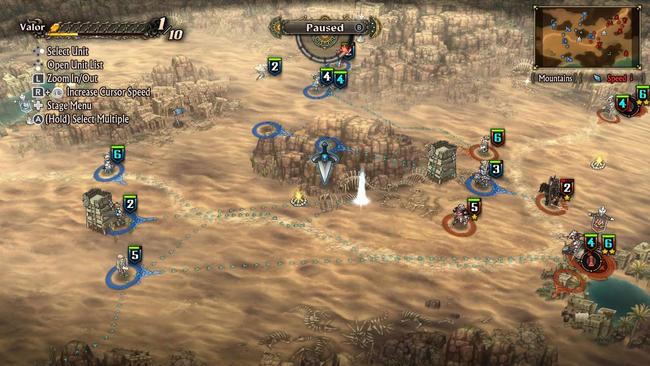
On most of the difficulties in the game, you aren’t made to engage with most of the mechanics on offer. You can get by without much resistance, but players who dive in deep will find it even easier. If Tactical didn’t require me to pay attention to team composition, I highly doubt Normal and Story would. Enemy numbers and stats can increase, but their tactics never become more complicated than running straight at you. I think a lot of SRPGs are restricted in ways that hide this better, but Unicorn Overlord being more of an RTS lays the simplicity bare. There’s just too much in the player’s favor, so the allusion of difficulty never feels like a present threat.
A hilarious strategy I found out was how enemies with 0 AP are only really weakened when you choose to have them recover. Wait time can be negated with a Valor Skill or item, which is overpowered in its own right, but if you leave them as is they’ll still be at full strength. If you have an especially strong character, you can just leave them in a spot to attract enemies and keep them occupied while most of your forces move on. Or you can have that strong unit challenge the boss, run out of AP, and then daisy chain them close to that boss by switching out another unit that goes to attack them. Unicorn Overlord has a system where whenever your unit makes contact with an enemy a circle will appear around them. If any ally is in this circle, you can switch them into the initiator’s spot to do the battle instead. This is great for if you underestimated a foe and found an incompatibility with your squad, and can just switch them out to keep them safe. But the only units to lose AP from doing this are the unit that ends up fighting the battle, and if that unit has 0 AP already they won’t lose any. So you can essentially daisy chain your strong unit next to a boss to just keep at it until it dies, and it was funny every time it happened. I don’t think this is a game-ruining exploit, but I think maybe tactical and higher difficulties should have given 0 AP units some kind of debuff.
Expert feels like the only difficulty where care was put into balancing the gameplay, and the one I’d say to play from the outset if you have even a passing understanding of RPGs. The game lets you switch at any moment, and every time I did so I felt myself enjoying the game much more. But I still found myself on Tactical for a majority of my playthrough, because I wanted to see if the mode would pick up. Don’t be afraid to go back and forth between difficulties if you feel underwhelmed or bored, but I’d probably say to just start on Expert mode.
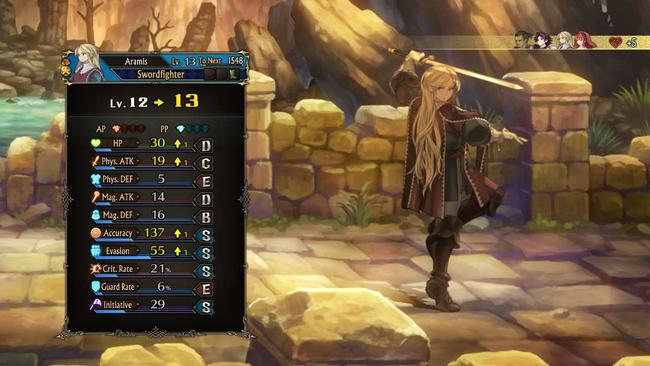
However, Expert doesn’t resolve every complaint I had, such as the mission variety being rather limited. I think I can count the number of times the mission objective wasn’t just “kill the commander” on a single hand. Since the mission maps are just sanctioned off parts of the normal map, there’s not really a chance for the game to get too creative with map design either. Those handful of missions where you aren’t just killing the enemy fast are where this best shines, like the mission where you need to prevent a forest fire from spreading to an important tre,e or where you need to navigate through a blizzard with no objective given initially. Every time these came up I got excited that they were signaling a turning point, but then the game would fall back into line.
Exploration is probably where this game shines the brightest, and I have very little qualms with it. The sense of discovery early on, as you make your way through a dangerous world controlled by the empire is without a doubt the most fun I had. Unicorn Overlord lives and dies by its world map. You actually walk your sprite of Alain around it, you visit towns, and all of the battles in the game take place exactly on it. There’s never a moment where you feel like you leave it, outside of the gorgeous cutscenes and the battle animations. Clearing a mission and liberating the area will allow you to then explore that part of the map as Alain, unlocking towns to restore with resources you’ll find on the map. There’s a solid amount of activities in an area after it’s liberated, but I feel it shows its hand pretty early to all the different things to do on offer.
This is also how you increase your Renown, which gives rewards in lettered tiers like the ability to expand formations up to five units and unlock new ones The way you’ll do this is by spending Honors, a point system you’ll also get by helping people and doing side content. This small way exploration is tied into customization is brilliant, rewarding you mechanically for playing the game in line with Alain’s character motivations. Occasionally you’ll have a couple of moral dilemmas that play out in the side content that’ll affect the outcome of that small story, but they never have overarching consequences. However they can usually be boiled down to getting a new party member or not, so I felt the writing here would often lack bite.
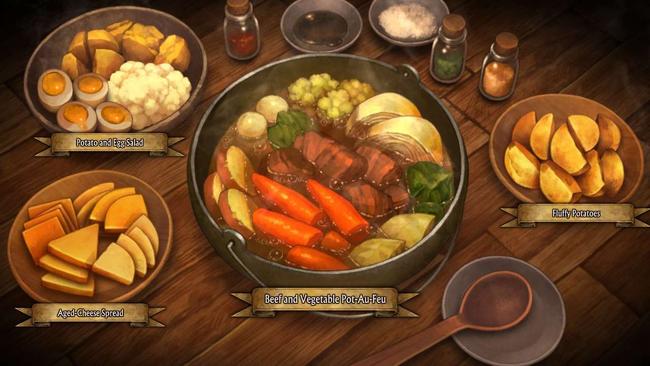
Characters will grow closer with one another as you fight with them, and this is how you unlock Rapport conversations. A lot of the character details are here, and this is the best writing you’re likely to find in the game. For some reason though, despite the rest of the game being fully voiced, there’s no voice acting for these scenes on either voice track. Bond levels can also be increased by taking a group of characters to a Tavern in an upgraded main town, which allows you to spend money to eat a meal with your friends. You won’t find new conversations from this, but the characters will make quick remarks about the delicious food drawn by Vanillaware’s talented artists. Alain can also assign a party member to a particular town, but all this does is allow them to be given gifts to increase their bond with him and collect items when you’re not there. Gifts are a pretty fast way to max out Alain’s relationship with a specific unit, but it’s funny how over a period of about 10 seconds Alain can go from not knowing someone to being able to marry them. It’d be nice in general though if most of this system wasn’t so Alain-centric, since he’s not an interesting enough character to have all the most interesting parts of the system exclusive to him.
All of these mechanics outside of battle are great, but as I liberated more and more of the world a thought came to my mind. “Where’s the resistance from the Empire?” I was waiting for a moment when they’d make a push back and try to reclaim their territory, leading to tense moments of having to fight back and keep towns safe. Maybe this was a secret reason to assign characters to liberated towns? Or maybe I’d be punished for taking too long exploring a region, leading to a harder final mission there to raise the stakes. That never happens. The threat starts manageable and gets even easier the more you explore, which I’ll at least admit leads to a sense of satisfaction in reclaiming the world from tyranny. However, for a story about a threat that was able to take over the entire world it feels a tad hollow seeing how little you feel you have to work towards liberating it. While this just circled back to my difficulty complaints, I feel it bleeds over into the story as well.
Emperor Galerius, an imposing threat that shows up in the prologue to slay Alain’s mother and give him a motivation for his quest, appears once more in the game’s first chapter and then never again until the very end of the game. From playing the story to its completion I know that this incompetent Empire isn’t commentary, but comes off as more of an oversight. It’s great that you get to start from nothing and slowly gain the power to overthrow the empire, but there’s very little friction thanks to how open the game can be. It ultimately makes the stakes of the story non-existent. An early example is Alain’s friend Scarlett being kidnapped by the empire, with a time limit implied that isn’t actually utilized in the gameplay loop. I’ve played games my entire life and understand the need to suspend my disbelief, but this lack of immediacy bleeds over into the rest of the game.
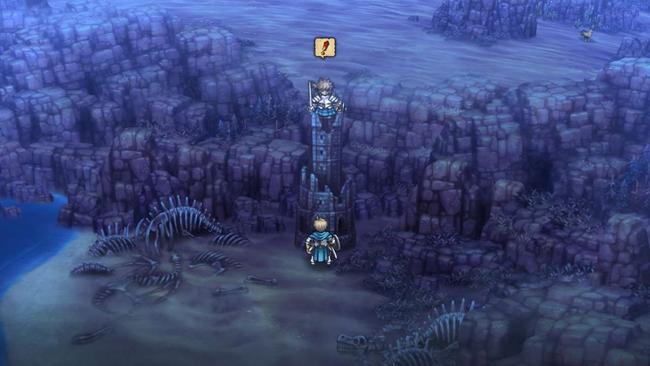
You can figure the formula out pretty quickly, and it rarely deviates from this so most of the gameplay and story is sadly predictable. I find the cast charming, but the plot lacks interesting moments outside of a couple of neat lore tidbits and the themes aren’t anything special for the genre. You’re dealing with a simple good vs evil war tale, with very little to say regarding the complex nature of conflict humans find themselves pulled toward throughout history. This sounds damning, but I don’t think Unicorn has enough to say in general to rake it over the coals. There’s a concept established early on, for example, of a magic spells that brainwashes people to serve the empire. This naturally made me worried that a lot of the villains in the story would be given passes for atrocities committed, but this concept is essentially dropped early on, leaving me uncertain why they established it to begin with.
There’s one character in particular this happens to that has fascinating development delegated to side content, but most characters that have this spell cast on them shrug it off and join you (with some lines in rapports related to it, if they’re lucky) or die. Unicorn Overlord is ultimately not about why humanity finds themselves drawn into war again and again, it’s about coming together to defeat an imperialistic threat. You know what? That’s fine, and I respect its devotion to this single idea. It unfortunately just leads to a simple central conflict devoid of many moving parts.
I think one of the reasons I felt disappointed by the story is because the way it presents itself is absolutely top-class. The English script reads beautifully, with excellent prose delivered strongly by fantastic voice actors. The dub cast is quite large, and largely filled with many actors you’d hear in SEGA/ATLUS games, but there are no weak links. Everyone gives it their all, and the setting manages to feel like authentic fantasy. While the plot is simplistic, the flowery dialog gives it weight that kept me engaged for a lot of it. I’d say the presentation as a whole is the game’s strongest aspect, which makes total sense given Vanillaware’s pedigree.
The story and gameplay feel incompatible, especially with how it plays out thanks to the non-linearity. The game isn’t truly open world, but offers opportunities to sequence break the order in which you play the continent story arcs if you clear liberation missions earlier than you’re supposed to. Because of this, the writers aren’t sure you’d have key characters outside of the continent you find them on, so for most of the game they simply don’t feel present. While I like how this makes the stories feel episodic, it makes them also feel disconnected.
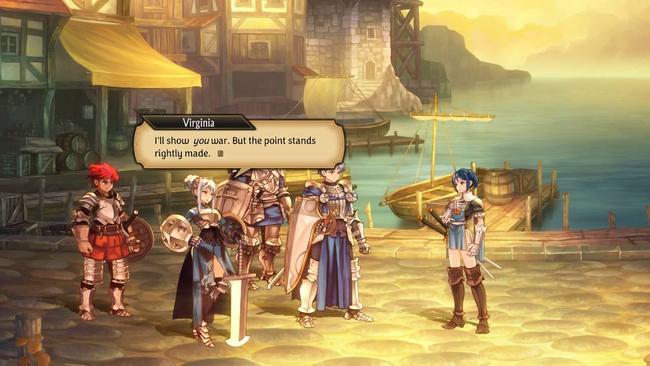
While I can say without a doubt that Unicorn Overlord was a game I had a lot of fun with, I’m frustrated at the many ways it just didn’t come together. There is so much missed opportunity here, but that also means there is a lot of room to grow. I’d love to see a follow-up to this, one that uses what was established here as a base to build and experiment on. The customization is more in-depth than most RPGs, and playing Expert helps to make it truly shine. However, I’d argue it is a flaw for a game to only have a single difficulty option that offers a fulfilling gameplay experience for players. If the story had been better, I could have forgiven a lot of my issues with the gameplay. But we’re left with a narrative with almost no stakes that plays it safe for its entire 50-hour runtime. If the gameplay had just been a bit fine-tuned and balanced better, I’d then be able to forgive the forgettable story. If both had been as good as the exploration, we could have had the greatest SRPG ever made.
That’s what’s so underwhelming to me. Outside of the art direction, nothing in this game excels past being just good enough. There’s nothing in this game that feels truly awful, but it rarely manages to achieve excellence. This wouldn’t be a problem usually, because I have no qualms with games that are just fine. It’s a game I wanted to love, and one I see why so many others love, but just couldn’t find that love for myself. It lets me down so much because these ideas and systems feel like they have so much potential. This features the most in-depth customization I've ever seen in this genre, but I think the freedom on offer leads to an unbalanced final product. So often I felt threatened with more than a good time, told to get excited for cool things to come soon. But it just didn’t deliver that. This review might seem negative, but that’s because what this game does best isn’t unique to itself or terribly interesting. The successful elements are all skin deep.
The games Unicorn Overlord was inspired by didn’t have a template to follow, so they took risks to see how they could leave their own marks. Unicorn Overlord seems allergic to risk-taking, and it makes for a safe and enjoyable product that fails to introduce anything new. So when I was given just a passable game, I couldn’t help but be let down.